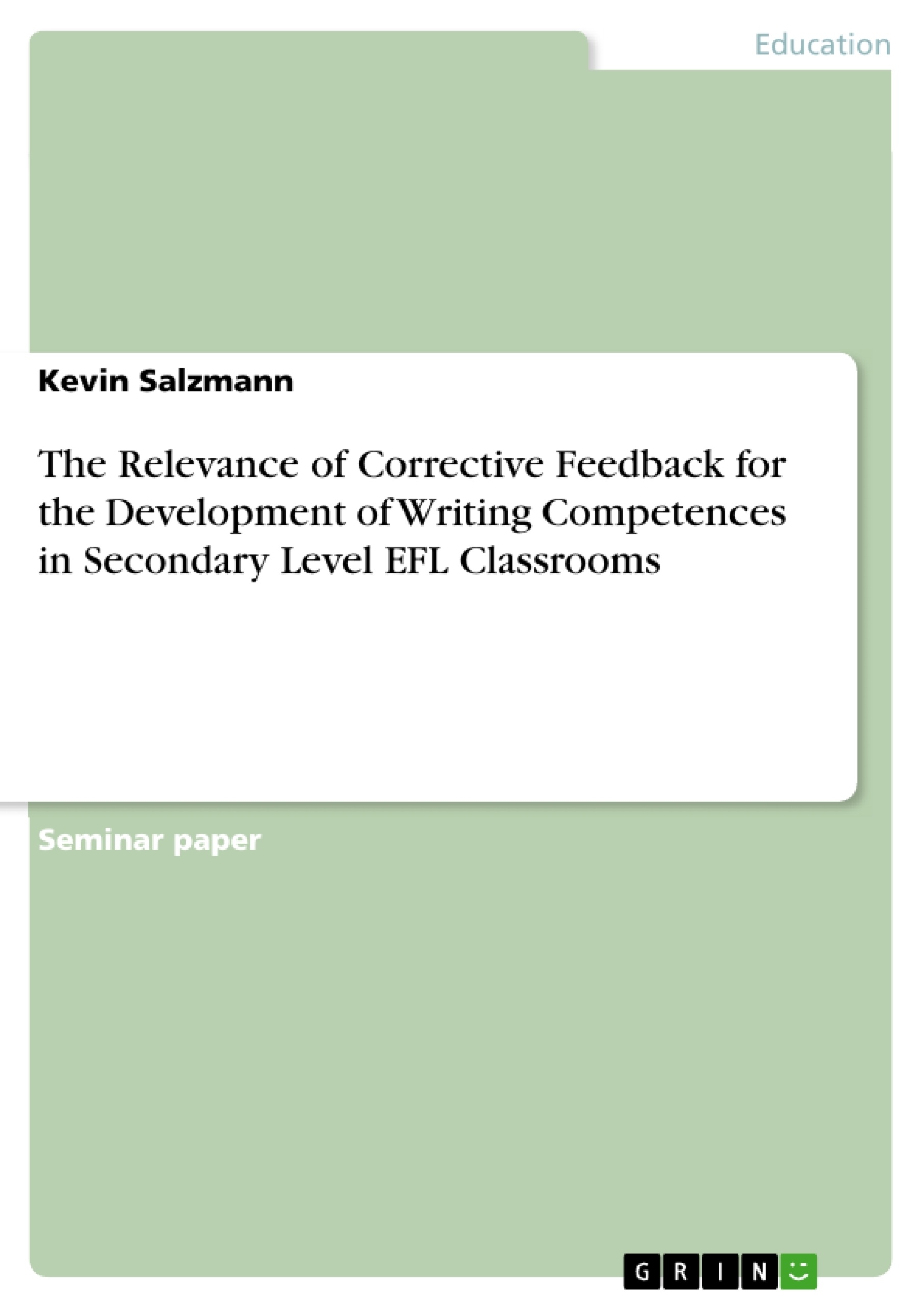Given that mistakes and errors are inevitable in second language acquisition, EFL teachers have to provide corrective feedback (CF) for their students to promote writing accuracy. In second language acquisition research, CF is a topic of great interest since Truscott (1996) argued that error correction has no significant effect for students’ new pieces of writing. Ferris (1999) and several other advocates have proven that different types of CF can be beneficial for L2 writing accuracy; however, as this thesis will demonstrate, direct and indirect types, as well as focused and unfocused types of error correction rely on different didactic approaches with different effects in students’ language awareness to be expected.
As studies on written corrective feedback present divergent results, further research has to be done to get deeper insight into feedback practices that also include personality factors and other individual learner differences that might affect students’ perceptions of different CF strategies.
Table of Contents
- Introduction
- The Role of Errors in Second Language Acquisition
- Mistake vs. Error
- Error Analysis: Theoretical Development
- Types of Errors
- Written Corrective Feedback in the EFL Classroom
- Research on Corrective Feedback
- Error Treatment and its Significance
- Types of Written Corrective Feedback
- Direct vs. Indirect Feedback
- Focused vs. Unfocused Feedback
- Efficacy of Written Corrective Feedback
- Error Correction and Feedback from a Constructivist Perspective
- Error Analysis and Corrective Feedback in Practice
- Example from a Secondary Level EFL Student
- Analysis of the Student's Errors
- Task 4a: Summary
- Task 4b: Stuart's Future
- Key Sources of Errors
- Explanation and Legitimation of the Applied WCF
- Discussion and Conclusion
Objectives and Key Themes
This term paper examines the relevance of written corrective feedback in secondary level EFL classrooms, focusing on its impact on students' writing competence development. The paper explores the theoretical basis of errors in second language acquisition, including the different types of errors and their significance. It investigates the effectiveness of different corrective feedback strategies, such as direct vs. indirect, and focused vs. unfocused feedback, considering their impact on students' language awareness.
- The role of errors in second language acquisition
- The effectiveness of different corrective feedback strategies
- The impact of corrective feedback on students' language awareness
- The application of corrective feedback in practice
- The connection between corrective feedback and a constructivist perspective on language learning
Chapter Summaries
The first chapter introduces the topic of written corrective feedback in secondary level EFL classrooms. It highlights the need for corrective feedback to improve writing accuracy and discusses the challenges and complexities of implementing effective feedback strategies. The chapter also explores the debate around the effectiveness of corrective feedback, considering contrasting perspectives on its impact on students' writing performance.
The second chapter delves into the role of errors in second language acquisition. It clarifies the distinction between mistakes and errors, highlighting the importance of errors as a natural part of the language learning process. This chapter also provides a theoretical framework for understanding error analysis and its contribution to language teaching.
The third chapter explores different types of errors, offering a categorization framework for understanding the various linguistic errors students make. This chapter contributes to a deeper understanding of the challenges teachers face in providing effective corrective feedback.
The fourth chapter focuses on written corrective feedback in the EFL classroom. It examines existing research on corrective feedback, discussing its effectiveness and exploring different approaches to error treatment. This chapter also delves into the practical implications of different feedback strategies, such as direct vs. indirect feedback and focused vs. unfocused feedback.
The fifth chapter explores the relationship between corrective feedback and a constructivist perspective on language learning. It discusses how student-centered techniques can enhance the effectiveness of error correction and promote the development of writing competence.
The sixth chapter provides practical examples of error analysis and corrective feedback in secondary level EFL classrooms. It analyzes a text written by a grade 8 student, identifying specific errors and illustrating how corrective feedback can be applied to improve writing skills. This chapter also explores the key sources of errors and the rationale behind the chosen feedback strategies.
Keywords
The central focus of this term paper is on written corrective feedback, error analysis, second language acquisition (SLA), and the development of writing competence in secondary level EFL classrooms. The paper explores the effectiveness of various corrective feedback strategies, including direct and indirect feedback, focused and unfocused feedback, and examines their impact on students' language awareness. The paper also considers a constructivist perspective on language learning and the importance of student-centered error correction techniques.
- Citation du texte
- Kevin Salzmann (Auteur), 2015, The Relevance of Corrective Feedback for the Development of Writing Competences in Secondary Level EFL Classrooms, Munich, GRIN Verlag, https://www.grin.com/document/316205



